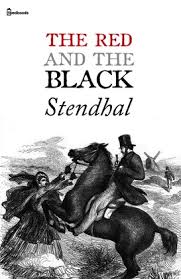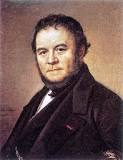The Red and the Black Page #17
Le Rouge et le Noir is a historical psychological novel in two volumes by Stendhal, published in 1830. It chronicles the attempts of a provincial young man to rise socially beyond his modest upbringing through a combination of talent, hard work, deception, and hypocrisy.
"In future," continued Julien, "I will only reckon on those elements in my character which I have tested. Who could have told me that I should find any pleasure in shedding tears? How I should like some one to convince me that I am simply a fool!" Three days later, Julien found the excuse with which he ought to have been prepared on the first day; the excuse was a piece of calumny, but what did it matter? He confessed to the curé, with a great deal of hesitation, that he had been persuaded from the suggested union by a reason he could not explain, inasmuch as it tended to damage a third party. This was equivalent to impeaching Elisa's conduct. M. Chélan found that his manner betrayed a certain worldly fire which was very different from that which ought to have animated a young acolyte. "My friend," he said to him again, "be a good country citizen, respected and educated, rather than a priest without a true mission." So far as words were concerned, Julien answered these new remonstrances very well. He managed to find the words which a young and ardent seminarist would have employed, but the tone in which he pronounced them, together with the thinly concealed fire which blazed in his eye, alarmed M. Chélan. You must not have too bad an opinion of Julien's prospects. He invented with correctness all the words suitable to a prudent and cunning hypocrisy. It was not bad for his age. As for his tone and his gestures, he had spent his life with country people; he had never been given an opportunity of seeing great models. Consequently, as soon as he was given a chance of getting near such gentlemen, his gestures became as admirable as his words. Madame de Rênal was astonished that her maid's new fortune did not make her more happy. She saw her repeatedly going to the curé and coming back with tears in her eyes. At last Elisa talked to her of her marriage. Madame de Rênal thought she was ill. A kind of fever prevented her from sleeping. She only lived when either her maid or Julien were in sight. She was unable to think of anything except them and the happiness which they would find in their home. Her imagination depicted in the most fascinating colours the poverty of the little house, where they were to live on their income of fifty louis a year. Julien could quite well become an advocate at Bray, the sub-prefecture, two leagues from Verrières. In that case she would see him sometimes. Madame de Rênal sincerely believed she would go mad. She said so to her husband and finally fell ill. That very evening when her maid was attending her, she noticed that the girl was crying. She abhorred Elisa at that moment, and started to scold her; she then begged her pardon. Elisa's tears redoubled. She said if her mistress would allow her, she would tell her all her unhappiness. "Tell me," answered Madame de Rênal. "Well, Madame, he refuses me, some wicked people must have spoken badly about me. He believes them." "Who refuses you?" said Madame de Rênal, scarcely breathing. "Who else, Madame, but M. Julien," answered the maid sobbing. "M. the curé had been unable to overcome his resistance, for M. the curé thinks that he ought not to refuse an honest girl on the pretext that she has been a maid. After all, M. Julien's father is nothing more than a carpenter, and how did he himself earn his living before he was at Madame's?" Madame de Rênal stopped listening; her excessive happiness had almost deprived her of her reason. She made the girl repeat several times the assurance that Julien had refused her, with a positiveness which shut the door on the possibility of his coming round to a more prudent decision. "I will make a last attempt," she said to her maid. "I will speak to M. Julien." The following day, after breakfast, Madame de Rênal indulged in the delightful luxury of pleading her rival's cause, and of seeing Elisa's hand and fortune stubbornly refused for a whole hour. Julien gradually emerged from his cautiously worded answers, and finished by answering with spirit Madame de Rênal's good advice. She could not help being overcome by the torrent of happiness which, after so many days of despair, now inundated her soul. She felt quite ill. When she had recovered and was comfortably in her own room she sent everyone away. She was profoundly astonished. "Can I be in love with Julien?" she finally said to herself. This discovery, which at any other time would have plunged her into remorse and the deepest agitation, now only produced the effect of a singular, but as it were, indifferent spectacle. Her soul was exhausted by all that she had just gone through, and had no more sensibility to passion left. Madame de Rênal tried to work, and fell into a deep sleep; when she woke up she did not frighten herself so much as she ought to have. She was too happy to be able to see anything wrong in anything. Naive and innocent as she was, this worthy provincial woman had never tortured her soul in her endeavours to extract from it a little sensibility to some new shade of sentiment or unhappiness. Entirely absorbed as she had been before Julien's arrival with that mass of work which falls to the lot of a good mistress of a household away from Paris, Madame de Rênal thought of passion in the same way in which we think of a lottery: a certain deception, a happiness sought after by fools. The dinner bell rang. Madame de Rênal blushed violently. She heard the voice of Julien who was bringing in the children. Having grown somewhat adroit since her falling in love, she complained of an awful headache in order to explain her redness. "That's just like what all women are," answered M. de Rênal with a coarse laugh. "Those machines have always got something or other to be put right." Although she was accustomed to this type of wit, Madame de Rênal was shocked by the tone of voice. In order to distract herself, she looked at Julien's physiognomy; he would have pleased her at this particular moment, even if he had been the ugliest man imaginable. M. de Rênal, who always made a point of copying the habits of the gentry of the court, established himself at Vergy in the first fine days of the spring; this is the village rendered celebrated by the tragic adventure of Gabrielle. A hundred paces from the picturesque ruin of the old Gothic church, M. de Rênal owns an old château with its four towers and a garden designed like the one in the Tuileries with a great many edging verges of box and avenues of chestnut trees which are cut twice in the year. An adjacent field, crowded with apple trees, served for a promenade. Eight or ten magnificent walnut trees were at the end of the orchard. Their immense foliage went as high as perhaps eighty feet.
Translation
Translate and read this book in other languages:
Select another language:
- - Select -
- 简体中文 (Chinese - Simplified)
- 繁體中文 (Chinese - Traditional)
- Español (Spanish)
- Esperanto (Esperanto)
- 日本語 (Japanese)
- Português (Portuguese)
- Deutsch (German)
- العربية (Arabic)
- Français (French)
- Русский (Russian)
- ಕನ್ನಡ (Kannada)
- 한국어 (Korean)
- עברית (Hebrew)
- Gaeilge (Irish)
- Українська (Ukrainian)
- اردو (Urdu)
- Magyar (Hungarian)
- मानक हिन्दी (Hindi)
- Indonesia (Indonesian)
- Italiano (Italian)
- தமிழ் (Tamil)
- Türkçe (Turkish)
- తెలుగు (Telugu)
- ภาษาไทย (Thai)
- Tiếng Việt (Vietnamese)
- Čeština (Czech)
- Polski (Polish)
- Bahasa Indonesia (Indonesian)
- Românește (Romanian)
- Nederlands (Dutch)
- Ελληνικά (Greek)
- Latinum (Latin)
- Svenska (Swedish)
- Dansk (Danish)
- Suomi (Finnish)
- فارسی (Persian)
- ייִדיש (Yiddish)
- հայերեն (Armenian)
- Norsk (Norwegian)
- English (English)
Citation
Use the citation below to add this book to your bibliography:
Style:MLAChicagoAPA
"The Red and the Black Books." Literature.com. STANDS4 LLC, 2025. Web. 10 Mar. 2025. <https://www.literature.com/book/the_red_and_the_black_201>.








Discuss this The Red and the Black book with the community:
Report Comment
We're doing our best to make sure our content is useful, accurate and safe.
If by any chance you spot an inappropriate comment while navigating through our website please use this form to let us know, and we'll take care of it shortly.
Attachment
You need to be logged in to favorite.
Log In